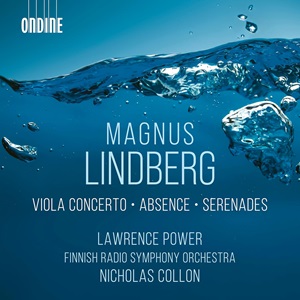
Magnus Lindberg (b. 1958)
Viola Concerto (2023-4)
Absence (2020)
Serenades (2020
Lawrence Power (viola)
Finnish Radio Symphony Orchestra/Nicholas Collon
rec. 2023, Helsinki Music Centre, Helsinki, Finland
Ondine ODE1436-2 [62]
I find Magnus Lindberg to be one of the most exciting composers around. His scores glitter and sparkle; there are powerful themes and a rich texture with a great deal going on. His music also has a strong onward momentum, and he can write really fast music. I look out eagerly for each new work of his, acquire the recordings as soon as I can and have rarely been disappointed. He has been well served by the record companies, notably but not only by the Ondine label, and it is they who have issued this latest disc.
Here we have three recent works. The main one is the viola concerto, a big work which runs for over half an hour. Lindberg has already written several concertos: three for piano, two each for violin and cello and one for clarinet. Having written for both higher and lower strings, it is easy to understand that he was interested to write for the viola. The orchestra here is a Mozart-sized one, with only double wind and no heavy brass. The work is in three main movements, though between the second and the third there is a short movement called Trio, a cadenza-like passage marked ‘Quasi una cadenza’, an Interlude and a main cadenza before the finale.
The concerto begins with an arresting passage on the brass, after which the soloist enters. Lindberg does not follow the traditional layout for a concerto first movement but, rather, creates a dialogue between soloist and orchestra with a number of sections of different character. There is a short break before the second movement which particularly explores the low register of the soloist, though there are occasional ascents. Lindberg allows the soloist to improvise the main cadenza, after which the finale is fast and rhythmic and also more cheerful than the preceding movements, as if something difficult has now been resolved. Violists have been lucky with recent concertos for their instrument: those by Brett Dean and Sofia Gubaidulina are worth hearing, and this concerto can join them.
There are then two shorter pieces. Absence is a short single movement which explores the idea of absence by way of developing one of the themes from Beethoven’s Les Adieux sonata. There are also quotations from some other works, including Debussy’s La Mer. But the work is in no way derivative: it is very much in Lindberg’s own idiom and, indeed, is a classic example of it. It is perhaps the most immediately attractive of the three works here.
Finally, we have Serenades, another single movement work which is clearly playful, with many twists and turns and also quotations from several other works. It is not very like a classical serenade, which was an entertainment work in several movements, sometimes with a concerto section, but it is light-hearted and beguiling.
The British conductor Nicholas Collon works mainly overseas and is, among other posts, currently chief conductor of the Finnish Radio Symphony Orchestra. I think he may be new to Lindberg, but the orchestra is certainly not, having recorded many of his works under several different conductors. Their playing is confident and idiomatic and Collon has a good track record in contemporary music. Lawrence Power was the soloist in the premiere of the viola concerto and is its dedicatee. He seems thoroughly inside the work and delivers an eloquent performance.
The recording is up to Ondine’s usual high standard and the presentation is immaculate. Lindberg fans need not hesitate, and those new to the composer would enjoy this also.
Stephen Barber
Buying this recording via a link below generates revenue for MWI and helps us keep free access to the site


















